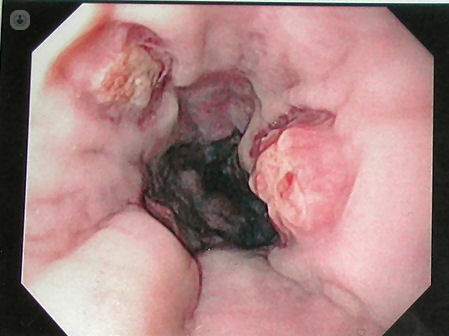

What are oesophageal varices?
Oesophageal varices are abnormally dilated veins in the lower part of the oesophagus, through which blood flows that would normally pass through the liver. The veins are dilated as a result of blood flow restriction due to a diseased liver.
The main problem with these varices is the risk of rupture , which occurs when the pressure inside the veins is greater than the resistance of their walls, causing major haemorrhages that, in some cases, can be fatal.

Prognosis of oesophageal varices:
Oesophageal varices are a serious problem since bleeding cannot always be prevented, and can potentially be fatal. People who have already suffered a haemorrhage are much more likely to suffer another episode of bleeding. It should also be noted that up to one in three recurrences prove fatal. Oesophageal varices are associated with other types of disorders such as renal, cardiovascular, immune or respiratory disorders.
Symptoms of oesophageal varices:
Oesophageal varices do not cause any symptoms, and in many cases there are no symptoms at all, apart from bleeding. The symptoms of bleeding oesophageal varices are as follows:
- Vomiting
- Vomiting accompanied by a large amount of blood
- The sensation of feeling stunned
- Black stools
- In severe cases, a loss of consciousness may occur.
The specialist may suspect the presence of oesophageal varices if there are symptoms of liver disease, such as a yellowish colouring of the skin and the ‘whites’ of the eyes, which is known as jaundice; a tendency to bleeding, and the formation of haematomas and accumulation of tissue in the abdomen.
Medical tests for oesophageal varices:
The main medical tests for detecting or diagnosing oesophageal varices are:
- Endoscope examination: an endoscope is used to look for signs of bleeding, such as dilated veins, red patches or spots.
- Diagnostic imaging tests: these are scans using computerised tomography (CT) and ultrasound.
- Capsule endoscopy: this involves swallowing a capsule containing a micro camera that takes images of the oesophagus as it passes down the digestive tract.
What causes oesophageal varices?
Oesophageal varices sometimes develop when the flow of blood to the liver is obstructed, often by scar tissue in the liver caused by liver disease. This increases the pressure of blood flow in the vein that carries blood to the liver.
This pressure forces the blood to look for other places to flow, through smaller veins, and swells these veins because of the extra amount of blood, which can sometimes give way and rupture.
Some causes are:
- Acute liver scarring, or cirrhosis: some liver diseases can cause cirrhosis, such as hepatitis infections, alcoholic cirrhosis, fatty liver, etc.
- Blood clots, or thrombosis: a blood clot can cause the formation of oesophageal varices
- Parasites: schistosomiasis is a parasitic infection that can damage the liver, lungs, intestine, and bladder.
Can oesophageal varices be prevented?
To date, there is no specific treatment to prevent the onset of this disease in people with liver disease, although beta-blockers have been proven effective in preventing bleeding associated with oesophageal varices, although they do not prevent the formation of them as such.
Some ways to maintain a healthy liver and liver function include:
- Avoiding excessive alcohol consumption
- Maintaining a healthy, balanced diet
- Maintaining a healthy weight
- Reducing the risk of getting sick from hepatitis
- Using chemicals (domestic or at work) with moderation and caution.
Treatment for oesophageal varices
As already mentioned, the main goal of treatment for oesophageal varices is based primarily on preventing bleeding, which is potentially fatal. If bleeding occurs, there are ways you can try to stop it.
Treatments to prevent bleeding:
- Medication to lower blood pressure
- Use of elastic bands to compress bleeding veins
Treatment for haemorrhage: immediate treatment is essential in the event of haemorrhage. The treatments used to stop the bleeding and to try to reverse the effects of blood loss are as follows:
- Use of elastic bands to ligate bleeding veins
- Drugs that slow blood flow to the portal vein
- Divert blood flow out of the portal vein
- Restore blood volume, possibly by transfusion
- Antibiotics to prevent blood infection
- Liver transplant.
Which specialist treats oesophageal varices?
The specialist responsible for diagnosing and treating oesophageal varices are gastroenterologists.
